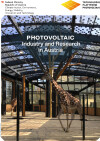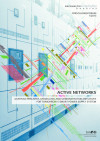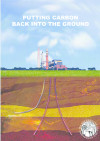Suchergebnisse
Development of a Cost-Benefit-Tool: costs and benefits of energy efficient and ecologic buildings
Development of a cost-benefit-tool which reaches beyond a pure cost approach and also recognizes the benefits of a building for its inhabitants and users. The inclusion of benefits is based on existing evaluation systems, especially on the Austrian building evaluation system TQB - Total Quality Building, which has been revised in 2009.
Recommendations for funding criteria to promote system benefits for medium and large battery storage systems
Market analysis and stakeholder process
World Circular Economy Forum (WCEF)
15. - 18. April 2024
Busseles (BEL) and Online
WCEF2024 will feature impactful circular solutions from around the world, guided by the latest scientific evidence.
IEA CERT-EGRD Discussion: Evaluating the impacts of energy innovation policies
29. October 2021, 13:00 - 16:00
Online
The event brings together practitioners from governments with distinguished international scholars to exchange experiences and recommendations about how to design and implement evaluations clean energy innovation policies effecitiveness, from R&D funding programmes to broader support for the energy innovation ecosystem, as well as how to use these findings to improve policy design.
M-ERA.NET Call 2021 Project Conference
1. - 2. April 2025
Elbflorenz Dresden Hotel in Dresden (D)
The M-ERA.NET network is preparing a conference “Connecting materials innovation actors in Europe and beyond” dedicated to the 70 transnational projects funded under the Call 2021.
Visualisation of IEA TCPs 2020
International activities for the energy supply of the future are taking place within the framework of IEA's technology cooperation. Visualisations based on a graph database show the extensive activities of the individual technology cooperation programmes (TCPs). The collaborations of countries on individual topics were made clearly visible, too.
IEA Experts Group "R&D Priority Setting and Evaluation" (EGRD) - Working period 2017 - 2019
The IEA Experts Group (EGRD) was established by the Committee on Energy Research and Technology (CERT). It examines analytical approaches to energy technologies, policies, and research and development and evaluates the benefits of RTI policies. Its results and recommendations feed into IEA analysis, and enable a broad perspective of energy technology issues.
NAMA Guidelines for Land-Use and Bioenergy (2010)

The land use and bioenergy sectors from an integrated system. This system has features that are likely to require approaches distinct from those suitable for other sectors. Thus, although a general framework for NAMAs has been developed, requirements appropriate to specific sectors are needed.
Mehrsprachig
Photovoltaic - Industry and Research in Austria

This brochure examines the existing domestic value creation in the field of photovoltaics and provides an overview of the Austrian research landscape, along with open research questions related to photovoltaic technology.
Herausgeber: Austrian Photovoltaic Technology Platform - TPPV supported by BMK (2024)
Englisch, 13 Seiten
Downloads zur Publikation
Active networks

Austrian research, modelling and demonstration initiatives for tomorrow`s smart power supply system
1/2013
Herausgeber: BMVIT
Englisch, 6 Seiten
Downloads zur Publikation
Fuel cells for distributed power: benefits, barries and perspectives (2003)

Detailed study of fuel cells covering a wide range of issues from the basics till to the market potential. The focus is put on stationary fuel cells.
Englisch
Energy Technology Perspectives 2015

Mobilising Innovation to Accelerate Climate Action
Herausgeber: International Energy Agency (IEA), ©OECD/IEA 2015 Energy Technology Perspectives, IEA Publishing
Englisch, 412 Seiten
Downloads zur Publikation
Putting Carbon back into the ground

Die Publikation "Putting Carbon back into the ground" des IEA Greenhouse Gas R&D Programme vom Februar 2001 zeigt die Möglichkeiten der Einspeicherung von CO2 und behandelt Fragen wie Umweltauswirkungen, Speichersicherheit und Kosten.
International Energy Agency
Englisch, 32 Seiten
Downloads zur Publikation
5th International Solar District Heating Conference
11. - 12. April 2018
Congress Graz
The conference on Solar District Heating (SDH) will focus on sharing market development and policy making experience, recent projects as well as latest trends in technology and system concepts.
IEA Experts Group "R&D Priority Setting and Evaluation" (EGRD). Working period 2020 - 2022
The IEA Experts Group (EGRD) was established by the Committee on Energy Research and Technology (CERT). It examines analytical approaches to energy technologies, policies, and research and development and evaluates the benefits of RTI policies. Its results and recommendations feed into IEA analysis, and enable a broad perspective of energy technology issues.
Integral Resource Optimisation Network - Concept
An integral control network for optimizing the resource "electrical energy". Concept for new, innovative services for the power market based on the latest advances in the field of modern information- and communication technologies.
Straw pellets for small-scale combustion units
Assessment of the operation of straw pellets fired small-scale combustion systems. Investigation and assessment of different refractory materials with respect to corrosion and evaluation of primary and secondary measures to reduce gaseous and particulate emissions.
"Green Biorefinery - Utilitsation of Grass Fibres"
Basic properties of grass fibres from a green biorefinery will be investigated in order to have a sound base for comparison of grass fibres with other renewable fibres. Selected prototype-products with these grass fibres as main raw material source (e.g. insulation materials, gardening material, animal nutrition) will be developed, tested and evaluated whether they are technologically as well as economically feasible.
Ecological and Social Efficiency Index - EASEY X
Basing on a model and indicators for valuing sustainability of companies quoted at the prime market of the Vienna stock exchange methods and instruments have been developed to analyse their performance. By the connecting step company data have been collected and analysed by four different methods (SPSS, EVA, SVA, MCA Outranking). On a 100 scores scale five companies exceeded barely the mark 70, 6 rank between 60 and 69 further 5 between 52 and 59. The aim is to launch a sustainability EASEY index 2004 or beginning 2005.
